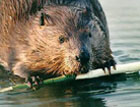Beavers return to Scottish waterways
The reintroduction of the beaver to Scotland is the first ever introduction of a native mammal species to the wild


Exquisite houses, the beauty of Nature, and how to get the most from your life, straight to your inbox.
You are now subscribed
Your newsletter sign-up was successful
The first beavers to live in Scotland for over 400 years have been released into the wild in Argyll. Marking the first formal reintroduction of a native mammal species into the wild in the UK, three beaver families, 11 beavers in total, have now been released at sites in Knapdale Forest, Mid-Argyll. The beavers, originally from Norway, have been chosen because they are considered to be the closest type to those once found in the UK.
Minister for the Environment, Roseanna Cunningham said: ‘While a great deal of research has already gone into the reintroduction this work is far from over. Observations and data collection over the next five years will play a crucial role in assessing the long term future for beavers in the Scottish landscape.’
The release is for a time-limited trial period and comes after years of lobbying by ecologists and conservation experts who believe that the beaver has been a missing part of our wetland eco-systems since being hunted to extinction in the 16th Century. The trial is mostly funded thanks to private donations and grants, including up to £1 million from Biffaward and support from People’s Postcode Lottery and People’s Trust for Endangered Species. However, some interested parties have reservations about the impact beavers could have on waterways in Scotland. Alan Kettlewhite, a biologist with Argyll Fisheries Trust, said fish could be affected: ‘Potentially they can alter the habitats of fish, restricting access to spawning grounds. The concerns are based on studies in other countries where sometimes dam-building can prevent fish access to their spawning grounds, particularly in dry years where you don't get much rain in the autumn time.’
* For more news stories like this every week subscribe and save
But supporters are confident that migratory fish will remain unaffected. Allan Bantick, Chair of the Scottish Beaver Trial partnership, commented ‘Our critics’ worry that beavers might pose a risk to migratory fish numbers, including salmon. This has not been found to be the case anywhere else in Europe. However, the notion cannot be tested with this trial because there is no Atlantic salmon present in the trial site. Our beavers will be released within a designated trial area, which should be large enough to sustain the natural expansion of their population over the next five years.
‘It is vital that our project is recognised as a time-limited trial with the purpose of assessing the effect beavers have on the local environment and how well they settle into their new habitat here in Scotland.’
SNH will co-ordinate the scientific monitoring work with a range of independent bodies, including Oxford University Wildlife Conservation Research Unit and the Argyll Fisheries Trust.
Exquisite houses, the beauty of Nature, and how to get the most from your life, straight to your inbox.
To comment on this article, use the comment box below, or email us at clonews@ipcmedia.com. Read more about the countryside.
